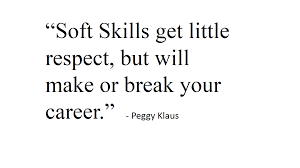Being a Good Listener is a Soft Skill →
“Be a good listener,” Dale Carnegie advised in his 1936 classic How to Win Friends and Influence People. “Ask questions the other person will enjoy answering.”
Rather than pushing your point of view when it is very different, the other person uses a curious approach to communication. An example would be meeting the other end of view with a question like: “I never thought of that point of view. What is it that leads you to that conclusion.”
Six things needed to be a good listener
#1 Your thoughts have not drifted, and you are in the here & now.
#2 Distractions don't get in the way of what the person is saying
#3 You're excited and curious to hear what is said
#4 You're sincere and open-minded about the questions and haven’t prejudged the anticipated answers
#5 Your hearing, sight, and other senses are working
#6 You ask the right questions.
“Hearing Aids Matter”
Preparation is a Soft Skill but it may require intuition →
Soft skills require preparation, such as time management, interpersonal communications, team building, listening, and negotiation.
You must discern what is needed as you prepare, or you will find yourself “all dressed up with nowhere to go.” (Maybe even wearing the wrong coat for the terrain)
Intuitiveness, the ability to know or understand something because of feelings rather than facts or proof, is a soft skill, and it will happen when you research why you are preparing.
Holding the chalk right and having what your right with it readable counts ………………..












